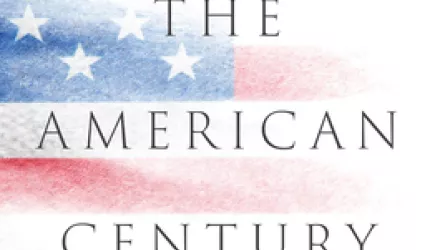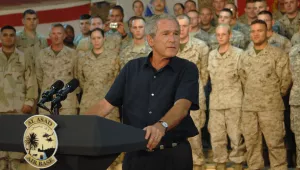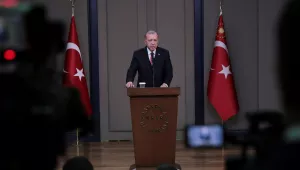Thomas Wright argues that only America can give the world the leadership it needs.
THE SINGLE MOST divisive issue in the world today is the United States of America and its role in global affairs. The events of the last few years have all moved millions, many previously apathetic, to political consciousness. According to most barometers of public and elite opinion, feelings against American foreign policy are at all time highs.
Nothing infuriates critics of American foreign policy more than the accusation that they are anti-American. And, of course, it is undoubtedly true that they are not driven by a dislike of Americans as a people. But it is a mistake to characterise the times we are living through as an ad hoc discussion of single issues, be they Iraq, Afghanistan, Kosovo or, for that matter, the openness of the international economy.
There is something else going on, a deeper trend that needs to be identified. For it affects our outlook on the world in fundamental ways.
A good answer requires a good question. And the appropriate question here is not whether one likes or despises a people. It is not even whether the United States is always right (something not even its most ardent enthusiasts would venture to claim) or always wrong.
Instead, the crux of the matter is whether the United States is generally right or generally wrong in its foreign policy and the way it uses its international influence; does it do more good than harm or more harm than good? Would the world be better off if the US remained unchallenged militarily—what is called a unipolar world—or if its global influence were to steadily diminish?
There is a parallel here with attitudes towards other great powers and movements. During the Cold War, you could be an anti-communist without hating ordinary Russians. It simply conveyed the belief that the Soviet Union was a malignant influence in international affairs, and that the world would be better off if it was considerably weaker. Similarly anti-EU campaigners direct their anger towards EU institutions and the process of integration, not the European people. Today, many people are increasingly motivated by a similar approach to the United States. Since America has always been an idea as well as a place and American an adjective as well as a nationality, this is the new anti-Americanism.
The new anti-Americans tend to believe that American foreign policy is almost always wrong and stands in the way of a more just international order based on the rule of law. Some see this as the inevitable result of a system corrupted by corporations, a military industrial complex, and a proclivity for domination, a view most prominently associated with Noam Chomsky. Others are sympathetic toward American ideals, but believe that great powers are inherently untrustworthy and destructive. Since the US is the world’s remaining superpower, it is, according to this view, the problem, the one remaining obstacle to the primacy of the United Nations.
The people who hold these views obviously disagree with the Iraq war. But their concerns do not stop there. Most also oppose high defence budgets and opposed the Afghanistan war, the Iraqi sanctions in the 1990s, the first Gulf War, the Cold War, and American intervention in developing world. The Kosovo war and the Balkans presented a problem, with some reluctantly backing NATO intervention as the lesser of two evils and others standing firm against ‘US militarism’. Financial globalisation and free trade also became objects of critique, outrage and resistance. In fact, most international institutions are viewed as tools of American power—IMF, World Bank, WTO, NATO—except, of course, for those the United States does not like, in which case they are elevated to centres of great wisdom.
Fundamentally, this antipathy to American behaviour is not about Bush. As is self-evident from the range of the discontent, it precedes him. Also, as some of the more observant of America’s critics have noted, including Vincent Browne in The Irish Times before the 2004 US election, more unites George W Bush and John F Kerry on foreign policy than divides them. In other words, it is not the difference between Republicans and Democrats that is the problem but the common ground they share—most notably support for the war on terror, the maintenance of a unipolar world, and a belief in the necessity of a strong military.
The new anti-Americanism’s way of conceptualising the world now underpins much of the discourse about international affairs in Ireland. Although individual governments often see things differently, the tide of popular opinion increasingly buys into the logic that America is, and has been, the problem rather than the solution. The leading thinkers and organs of this movement—Chomsky, John Pilger, Robert Fisk and the vast array of peace groups and activists that rail against Western ‘imperialism’ and ‘militarism’—are a powerful political force, albeit only on one side of the Atlantic.
America also animates the debate about European integration, as many federalists hope that a strengthened EU will form a counterweight to American power (the Chirac model). Isolationists, of course, resist such a move because they fear it will drag Europe into ‘America’s wars’. What unites these unlikely bedfellows is the belief that America’s influence is a nefarious one that needs to be challenged.
What is surprising is not that this anti-Americanism exists—it is a coherent interpretation of the world, even if some of us disagree strongly with it—but that it is not generally recognised as a single position. Many of its advocates dress it up as a case-by-case criticism of flaws in the American approach, even though it is much more than that. In a very real way, it is an ideological dagger aimed at the heart of the very principle of American leadership and the American led international order that has characterised the western world since its inception in the middle part of the last century. What is also surprising is that so much of this case has gone unchallenged. Where, one can justifiably ask, is the other side? Have those of us who see the United States as the linchpin of a stable, free and peaceful world dropped the ball?
The pro-America case is complicated by two problems. First, the debate is taking place about America’s weaknesses (e.g. an ongoing Iraq war) instead of its strengths (e.g. success in Afghanistan), even though the new anti- Americanism targets both. This is good in that America’s weaknesses need addressing, although it would be nice for once to hear how we can better help Iraqis toward freedom rather than just abandoning them to terrorists. But it does let those with another agenda off the hook, and means that pro- Americans are constantly on the back foot.
Second, one can be pro-American and against Bush’s foreign policy. But all too often, these sorts of arguments are appropriated by the new anti- Americans. Just think of how victory for John Kerry would have been interpreted throughout Europe as a rejection of the war on terror, instead of as a choice for a new and improved war effort.
Some pro-Americans may respond by defending every Bush policy and scheme, even if they do not necessarily believe in the superiority of Bush’s vision over the alternatives. After all, how can you criticise your best friend if your mutual enemy is the beneficiary? But while understandable, this is a mistake. For starters, fair criticism is not an option but a necessity. Moreover, conflating the case for America with the case for Bush’s foreign policy makes it contingent on the success of an administration that many pro-Americans have concerns about.
There is another way. Pro-Americans come in different shapes and sizes: liberals and conservatives, idealists and realists, EU enthusiasts and sceptics, Blairite hawks and German doves. Understandably, given the turbulent times we live in, these groups may disagree strongly over a host of foreign policy issues—but all have much more in common with each other than any has with the new anti-Americanism. Instead of holding their tongue, pro-Americans need to open up a second front and draw out America’s critics on the totality of their vision and worldview, rather than let them hide behind each individual case. They then explain why their agenda is wrong for Ireland, Europe and the world. There may be parallels here to the European project. In order for it to succeed, the case must be constantly made.
The most important question to pose is: how could the weakening of America’s power possibly make the world a better place. The new anti- Americans often behave as if the consequence of an end to US hegemony will be a world run by the United Nations based on justice and the rule of law, independent of the preferences and disproportionate influence of the great powers. Unsurprisingly, they cannot provide a single successful historical example where this happened. It was tried at least once, in the 1920s when war itself was outlawed, with predictable, predicted and catastrophic consequences as responsible states ceded influence to revisionist tyrants.
Weakening America will create a vacuum that would inevitably be filled by forces outside of Western control. It is a truth that in our broken world, some state will always exercise power. And it is best that this state is the United States. No other great power has behaved as benignly, sponsoring an international order based on openness, economic interdependence, the peaceful settlement of disputes between its allies and the promotion of democracy. Better this than jumping into the unknown on nothing more than a wing and a prayer.
Of course, this is where many readers may be inclined to dive for the computer to fire off an email about America’s record in the developing world, especially Latin America and Africa. But first, consider this.
Most examples of Western support for dictatorships and human rights abuses, including support for Pinochet in Chile and Mobutu in Zaire, occurred in the context of a global struggle against the Soviet Union. This just goes to show that great power competition leads states to do things they would normally not want to do. The emergence of a counterweight to American power, something many Europeans desire, will likely set off another struggle for global leadership and to the unfortunate trade-offs we saw all too often during the twentieth century—not to mention the likely abuses perpetrated, and damage wrought, by the rising challenger. Today, a unified and unrivaled Western alliance faces fewer impediments to promoting basic rights and pulling the rug from underneath dictators.
What of the argument that the counterweight could be a united federal Europe that would avoid these pitfalls. Well, apart from the fact that this is a fantasy—the EU is light-years away from the military assets necessary to be able to cope with threats to its security without American aid—it is unclear how a divided West can tackle the problems that pose such a challenge to a united West. Make no mistake, a unified West under American leadership is necessary if we are to make serious progress in eliminating global poverty, combating infectious disease and promoting democracy and human rights. And, of course, defeating terrorism.
Those who only see America as a modern-day Sparta should remember that the United States leads the world in funding to tackle the HIV/AIDS crisis, is indispensable in the aid effort in Tsunami-stricken Asia, played a critical role in preventing crimes against humanity in the Balkans, and continues to take risks to advance the peace process in Northern Ireland. Certainly, the US has made mistakes, the scandalous actions in Abu Ghraib being among the most egregious. But the American system has demonstrated a remarkable capacity for self correction. In that context, we should be intolerant of wrongdoing and continually work for improvement, rather than tear down what we have, oblivious to its overall merit.
At another level, an EU-US rivalry would be catastrophic for us. Ireland is almost unique among European states, with the possible exception of Poland, in being equally dependent upon the European Union and the United States. All governments have long recognised that Ireland’s interests are best served by strong relations with each, and never having to choose between them. Support for the US and the EU are not mutually exclusive, but complementary. Ironically, the institution that would appear best suited to keep them together is NATO, which is precisely the one we continue to have an irrational hostility towards—despite the fact that we consume the security it provides.
However, perhaps the strongest argument for American leadership is something we take for granted or attribute to something else—peace between the world’s leading powers.
The United States currently provides security guarantees, frequently encompassing a commitment to use nuclear weapons, to a great many states including Japan, Taiwan, South Korea, Australia, most of Eastern Europe, and, still, Western Europe. If America were to weaken or unexpectedly withdraw from its global commitments, it would have two potentially horrific consequences.
First, it would encourage aggression. The most likely reason that Russia did not suppress the recent orange revolution in Ukraine is not because it thought such a move would be wrong, but because it feared the American response. If America was too weak or unwilling to intervene, Putin could be expected to attempt to reconstitute the old Russian empire. The same may be true of China’s designs on Taiwan, and others not yet on our radar.
Second, many of America’s former client states would feel obliged to increase their military capabilities to make up for the resulting shortfall. This could ignite regional arms races, because others would see this as threatening. For instance, China would undoubtedly interpret any increase in Japanese defense expenditure, let alone its acquisition of nuclear weapons, as especially threatening. The point here is unmistakable. America is a pacifying influence on Asia and Eastern Europe. Remove the pacifier and be prepared for a much more volatile world.
All these reasons represent merely the tip of the iceberg. So why is the world more and more anti-American? Part of the reason is poor public diplomacy on the part of the US and some flawed policy choices. However, in large part, it is also because European public discussion of international relations is increasingly characterised by opinions without responsibility for their consequences. Ideas are imparted without ever facing up to what would happen if what was suggested came to pass. In such a world, it is easy to call for government by the United Nations, disarmament or negotiation with Milosevic/ the Taliban/ al Qaeda (select as appropriate).
It sounds nice. It allows its advocates to sleep easier. But deep down, we know it is contingent on having somebody else standing guard, who does not fall victim to these false comforts. Political scientists have a word for this: free-riding. It means refusing to live up to one’s responsibilities because somebody else will.
It is a mode of thinking that we Irish are particularly prone to, because we often confuse our peaceful nature as the result of a unique moral insight, instead of our unique geographical position between friendly states. Our politicians and commentators often argue that if others were just a little more like us and eschewed the use of force, everybody would be better off. It is a fantasy, but one that many embrace.
The next four years will almost certainly be a tough time to be a pro-American in Europe. But the value of a united Western alliance under American leadership remains. Labelling is usually unhelpful, a substitute for thinking rather than a means of achieving it, but there are times when the opposite is true, particularly if one carefully and fairly specifies their meaning.
A real understanding of what is at stake may help us advance the debate that has been raging for some time now, namely the very existence of the Western alliance and an American-sponsored international order.
Thomas Wright is a research fellow at Harvard University’s Belfer Center for Science and International Affairs
Wright, Thomas. “For Our Benefit, for Our Values.” Magill Magazine, March 16, 2005





